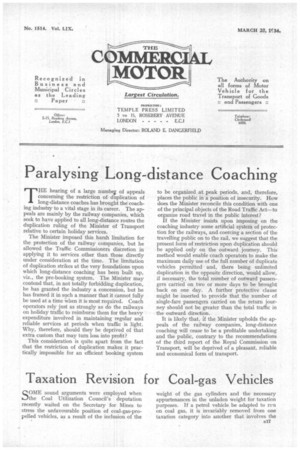Taxation Revision for Coal-gas Vehicles
Page 35

Page 36

If you've noticed an error in this article please click here to report it so we can fix it.
SOME sound arguments were employed when the Coal Utilization Council's deputation recently waited on the Secretary for Mines to stress the unfavourable position of coal-gas-propelled vehicles, as a result of the inclusion of the weight of the gas cylinders and the necessary appurtenances in the unladen weight for taxation purposes. If a petrol vehicle be adapted to run on coal gas, it is invariably removed from one taxation category into another that involves the payment of an appreciably higher licence fee. That is the case for the goods vehicle. So far as the passenger vehicle is concerned, the legal maximum weight limit might reasonably be assessed without the weight of the gas cylinders being taken into account, otherwise the loss of revenue-earning seats must inevitably result. As the electric vehicle is taxed without taking into account the weight of the batteries, surely the coal-gas vehicle should be similarly treated in the matter of its gas bottles and necessary fitments? Unfair discrimination of this kind places a scotch on progress and handicaps the user who is prepared to experiment with a new method of propulsion with a view to reducing costs and developing a fresh market for British fuel. Perhaps the Chancellor of the Exchequer has already noted the disparity and has made provision in the forthcoming Budget to rectify it.
Is An Appeal Worth While ?
THERE are occasions when small coach and bus i operators who have sound cases for appeal to the Minister of Transport against decisions of the Traffic Commissioners, neglect to do so because they are fearful of the possible cost. They may, therefore, find some consolation in the advice given recently by a Traffic Commissioner, in the case of a small man who, on being refused a back ing in a corridor area, after securing licences in both the primary and terminal areas, decided, on the ground of the probable expense, not to appeal. "Where an appeal is made," said the Commissioner, "there is no need for the appellant to be represented by an advocate and there are no hearing or court fees to be paid. If unsuccessful, he may have to bear the cost of appeal, including the expense of shorthand work, but the Minister can— and, in numerous cases, does—waive the costs."
In offering this advice, the Commissioner mentioned that it had been laid down by the Divisional and Appeal Courts that the Commissioners for backing areas are in no way bound by the decisions of those for the primary area. So far as this fact relates to corridor areas, we consider that the Road Traffic Act is at fault.
We see no reason why the granting of a backing in such an area should not be obligatory, if the Commissioners in the primary and terminal areas be satisfied that a service is desirable In the public interest. We can visualize the official objection to "fettering the discretion of the Commissioners," but surely that discretion counts for nothing if it be used to contradict the Commissioners who are mainly concerned with the service and who may be assumed to*know more of the public need for it? The granting of backings in corridor areas should be merely a formality and should possess no other significance.




































































































